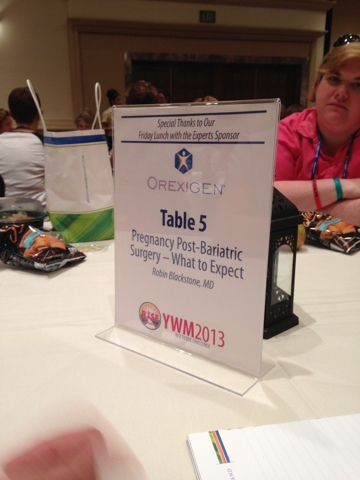One of the cool parts about the Obesity Action Coalition’s convention was sessions called “Lunch with an Expert.” These were table discussions where you could ask an expert in certain fields direct questions about their expertise. Since you guys sent me to this conference, I tried to pick lunches that addressed some of the questions I get from you guys.
The first one I attended, on Friday, was on pregnancy & weight loss surgery. It was led by Dr. Robin Blackstone of Scottsdale Health Care Bariatric Center. She’s worked a lot with patients who were preparing to conceive and post-ops who have gone through pregnancies.
She started off where a lot of GYN’s start off – by advising about birth control! She said that it’s important to be on a good method of birth control, especially in your losing phase. A woman of childbearing age is very fertile during this time because of hormonal changes brought on by rapid weight loss. She also pointed out that during the rapid weight loss, our bodies go into ketosis. Ketosis can affect a fetus. So it’s best to get cleared for pregnancy before actively trying to conceive. She did note, however, that in the event of an unplanned pregnancy, don’t panic. Just know your pregnancy will probably be deemed riskier and require a bit more medical intervention.
IMPORTANT: She told us that traditional birth-control pills are sugar-coated and thus people who had malabsorptive surgeries might not break them down properly. She said to ask your doctor to prescribe you a pill that is at least 3 mcg (or 0.2 mg), which increases the likelihood of absorption.
From there, we talked about preparing to conceive and she had some great wisdom to share:
- When you are preparing to conceive, it’s best to let your bariatric surgeon know about it (or it might be most effective, as she stated, to inform your bariatric nurse coordinator or an equivalent). At the very least, they should know just in case your obstetrician needs to consult with them, however, they may want to request a set of labs before you conceive.
- Dr. Blackstone advised to pay particular attention to thiamine levels. Thiamine deficiencies can cause major birth defects so you need to make sure yours are at a good level going in.
- In general, Dr. Blackstone suggests patients trying to conceive take an extra B-complex vitamin daily.
- Barring any special medical condition, it isn’t really necessary to take in a lot more food during pregnancy. Instead, she advises patients eat healthy meals more often for stable blood sugar.
- She said this several times, so I think it bears mentioning. The human body is designed to support the baby through this process, therefore the baby will take what it needs from your body. Don’t go overboard on anything “for the sake of the baby.”
- Make sure to maintain your protein levels at about 60-80g a day (or whatever your nutritionist recommends).
- Unrelated but related: Studies now show that most women need only gain about 20 lbs. during pregnancy (in the case of a singleton pregnancy, multiples would be different).
- IMPORTANT: People who have had RNY or the Sleeve should NOT get the traditional 2-hour glucose test (where they make you drink the syrup-y stuff). Not only will it likely make you sick, but it doesn’t always return an accurate reading. Request a blood glucose test instead!
- IMPORTANT: If you experience any abdominal pain (around the area of your stomach/sleeve/pouch, rib cage, etc.) get it checked out! She told us the story of a doctor in an ER who was stumped by a pregnant woman’s severe abdominal pain. She was a Lap-Band patient and her band had slipped pretty severely. They were able to get it out fast before it did any harm, but take that as a warning: ALWAYS take abdominal pain seriously!
- I also want to re-stress the many small meals throughout the day. Dr. Blackstone warned that pregnant women have to work especially hard to keep their bodies out of starvation mode. It shuts down your metabolism and can be counter-productive to your pregnancy)
- Find a weight-loss surgery specific pregnancy group (online or in person) where you can talk openly about your fears without judgment.
- If you feel extreme anxiety about your weight gain, seek psychological help!
- When seeking psychological help, find someone who has worked with bariatric patients before.
- Do it! Exercise after childbirth has many benefits.
- The baby gets more oxygen when mom exercises.
- Mom has more stamina/energy when she exercises
- Mom’s body is better prepared for childbirth when she exercises
- You can do most any exercise form you did before pregnancy, however, some modifications to movements may be necessary. Check with your OB/fitness professional to design a workout that’s right for you and your baby!
 Bariatric Foodie Play with your food
Bariatric Foodie Play with your food


WOW! Thank you. The health care professionals need to hear this!